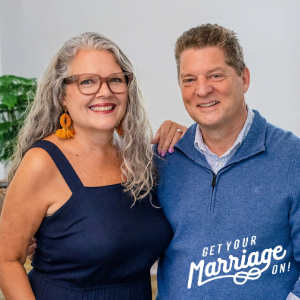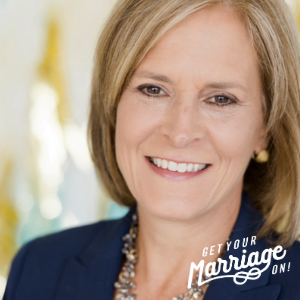Is it Okay?
Here at Get Your Marriage On!, we often receive questions about masturbation like these:
Is it okay to masturbate in marriage?
Is it okay to masturbate with my spouse?
What do I teach my kids about masturbation?
What do I do if my spouse masturbates?
These questions are hard because we want a simple answer: yes or no, black and white, right and wrong. However, as with most questions in life, there isn’t a simple answer. In order to find the truest and best answer, we often need to ask a better question. This week on our podcast, we talked with Dr. Jennifer Finlayson Fife about what those better questions are, how they relate to masturbation, and how we find our own answers to tough questions.
Why Are Many Anxious About Masturbation?
Let’s take a step back here. Why do we have so many questions about masturbation? Many of us grew up in homes where talking about sex and sexuality in general was treated as taboo and/or discouraged in general. Masturbation especially often fell into the “forbidden” category. A lot of rules change when we are married (sex is a green light now) but we can still find conflict between specific things we were taught and our current reality.
Stages of Development

Our anxieties about what is okay usually come from being stuck in less mature stages of development. When we are babies, we tend to be very impulsive. If something feels good, we do it; if it feels bad we avoid it. This impulsive stage is very inward focused, perhaps even considered selfish. For most of us, as we age we become socialized to our environment. We take on the ethics of the different groups we belong to (our families, schools, church, etc) and adopt these as organizing beliefs about the world. We try to fit in with the people around us and inhibit a lot of our impulsive behaviors in order to belong. This is called the inhibit stage.
Most of the time, when a person asks if masturbation is okay, they are toggling between these two stages. They are maybe inhibiting their impulses because they want to be good and adhere to the value structure around them. And sometimes, people cannot uphold these rigid standards and impulsively pleasure themselves. This then leads to a cycle of guilt and shame as they lean back into their more inhibiting stage and wanting to adhere to the “rules”.
The Shame Cycle
Shame diminishes our ability to sort out our own values and goodness. For example, let’s look at our relationship with food. Imagine your favorite food. For me, it’s English toffee. I can sit and eat toffee all day. However, a diet consisting of toffee alone would be very bad for me (t’s just butter and sugar ;). Well intentioned people may tell me, “What are you doing? You can’t eat that! You’re poisoning your body. Good people don’t eat toffee!” This will cause guilt. I may change my behavior to appease those people and appear good outwardly. The pressure of suppressing my impulses may build until I break and have a toffee binge. This binge will make me feel like a failure and I will usually try to hide my binge. Unfortunately for some, the rules their society creates around food lead to eating disorders.

Society and conservative culture have a lot to say about sex, and masturbation especially. These heavy (but unclear) expectations lead to a lot of anxiety in Christians who want to be good. This is why we get so many questions about masturbation. A lot of us (myself included) want others to tell us what is okay to calm the anxiety of wanting to be a good girl or boy and fit into the organizing beliefs of our culture.
It’s Not a Yes or No
When it comes to matters of morality and ethics, finding concrete answers can be hard. As Christians, we believe in God and His absolute truth. We know that God wants what’s best for us, and that includes staying away from sin, doing good, and following His commandments. That also includes finding happiness in our marriages. The hard part is deciding how to behave according to true principles in each unique situation. For example, using my spouse to selfishly appease my own carnal desires would be bad. But desiring my sexually because I want to create an intimate relationship with them is good. So where’s the line between the two? And how do we express those sexual feelings with each other?
Masturbation can have so many different meanings to different people and can exist in so many contexts. We all need to decide for ourselves our own values and stand by them no matter our outward influences (including circumstance, environment, and attitude of those around us).This is the third stage of being: it is about deciding who you want to be; it’s owning the principles and values and choosing to act with integrity because that it what you have chosen for yourself, not some external force. I call it the embodiment stage.
In her experience, JFF has discovered women who own, or self-author, their sexual choices (even if their choices are highly conservative), have higher sexual agency, confidence in their sexuality, and are better able to partner in marriage.
Men and women both benefit from self-authoring their stories about themselves and their sexuality. Both can break away from cycles of shame, guilt, and the loss of control that comes with getting stuck in impulsiveness and inhibition. Each partner owning themselves creates the foundation for strong and equal marriages and partnerships.
How do We Self-Author?

If you have some of these questions about masturbation or other behaviors, and want to live in the highest embodiment stage of being, turn inward and examine your own beliefs. I would recommend taking a few days to really think through these questions:
“Who do I want to be?”
“What do I value?”
“What do I want to bring to my marriage?”
I would also highly encourage any Christian to involve God in the process. Fast, pray, study in the scriptures and do whatever helps you feel closer to God. Ask Him who He would have you be. Try to find the core of who you are, outside of what people around you want of you.
Deciding for Yourself
Once you are centered in yourself, it’s time to decide for yourself. Take charge of your sexuality. What does sex mean to you? What do you believe is the purpose of sex? Examine your own ideas around sexuality. What are you afraid of? Where did you learn this? What parts do you reject? What do you choose?
When you have questions about a certain sexual act or behavior, ask things like the following:
“What’s the impact of this behavior?”
“What could this thing add to my marriage?”
“Does this align with true principles?”
“Does this foster honesty and connection and respect?”
““Which choice can I choose with integrity?”
All this questioning and self reflection is to help you take a hold of your own sexuality. Ideally, we want to move from an external locus of control (which looks like, “oh I can’t/ I shouldn’t/ I’m bad”) to an internal locus of control where you decide what you will stand for and who you will be. Instead of rebelling against or complying to others, you take the responsibility of becoming who you want to be.
Take a Vertical View

A wise church leader told me that too often our view is horizontal. We are looking around at everyone else, trying to measure up to their standards and ideas. Instead, let’s turn our focus vertical. We should be comparing our actions to the God above us and who He wants us to be; while recognizing the growth we have made. What do you want for your life and legacy?
The goal is to be at peace with yourself and your sexuality while using sexuality for good within your marriage. This is so much more important than stressing about what others might think of the finer details of your sex life. If you and your spouse decide that using masturbation in a certain context will add to your marriage and is in line with your values, then you don’t need to feel guilty. For example, some women feel they are better able to explore themselves to discover what helps them orgasm. Their husband can be right there with them, learning with their wife about her sexuality. On the other hand, if you don’t feel it is in line with who you want to be for you to masturbate, then that is absolutely acceptable as well.
Extra Tips
Here are a few more tips that can hopefully help you decide for you what your boundaries will be with masturbation. It is not inherently bad to touch your own genitals or to give yourself pleasure. Many spouses feel like it is their partner’s job to control their sexuality or make their sexuality legitimate. We expect our husband or wife to know how to please us and that it’s wrong for us to take charge of our own pleasure. This can lead to bigger problems in a marriage. It is also generally not helpful to search for sexuality outside of our spouse. Sex is a way to connect with our spouse, not to separate us from the one we love. If your masturbation is a secret from your spouse, that may be an indication that you are struggling to live within your values. If you would like more help deciding what is okay in your marriage, read our post What’s Okay?
Marriages Where Spouses Disagree

Another issue is when spouses disagree about the value of masturbation in their marriage. This can be really tricky. Our advice is to seek to understand them and yourself. Ask questions and listen without judgment. See if you can get to the bottom of their feelings (and yours) on the subject. If they are open to it, ask them to also seek to self-author and leave behind unhelpful outside influences on your shared sex life. Be respectful of their values and sense of self.
As you seek to understand them, stay centered in yourself. Carefully consider the views and opinions of your spouse. You may decide you also agree with them, but don’t make choices solely to make your spouse comfortable. This won’t lead to growth or becoming the person you want to be. Meaningful shifts in marriages are marked by changes. Remember that conflict is not a bad thing as it can lead to meaningful change in both of you. However, contempt and anger are not helpful. As JFF said, “weak people control others, strong people control themselves.” Don’t seek to manipulate your spouse into agreeing with you, nor should you change your values to make your spouse comfortable.
Have a conversation with your spouse about your values. Listen to them in turn. See if you can find a solution that you both can choose with integrity. Bring the best information to the conversation, not just information that will validate your point of view. If you need more help to navigate a solution, consider coaching as an option to help cause change and growth in your marriage.

Conclusion
There is a lot to talk about when it comes to masturbation in marriage. The bigger question is, are we self-authoring our own sexuality? Are we making choices with integrity that will add goodness to our marriage? As we seek to embody the self God wants us to be, we can more easily make choice about what sexual practices are right for our marriage.






